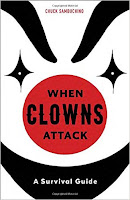 |
Christopher Chope
defends the circus. |
In the always emotive debate over animals in the circus, it’s rare to hear the calm voice of reason. But that view was provided in February by the
Conservative MP Christopher Chope when he said a ban on wild animals in the big top is unnecessary thanks to a licensing regime that has been in place since 2013.
Chope was speaking in the Commons as fellow Conservative
Will Quince introduced a private members bill to hasten a ban that the government announced in 2012 would be in place by the end of last year.
But as Chope pointed out, we are now entering the fourth year of a
licensing scheme that has rendered the management of animals in circuses completely transparent. Every aspect of the animals’ lives are strictly regulated, from the size of their accommodation to their diet and retirement plan. Circuses are subject to inspection several times a year, including unannounced visits.
During the past three years,
no fault has been found with the animals’ welfare, so why introduce a ban?
For the past 30 years, the conversation about animals in the circus has been dominated by animal rights groups such as
Peta that oppose the use of animals for any purpose on principle. Peta’s slogan is “Animals are not ours to eat, wear, experiment on, use for entertainment, or abuse in any other way.”
But accusations that life in the circus compromises an animal’s welfare have never been substantiated.
The
Radford Report, commissioned by the last
Labour government, found that circuses were as capable of meeting the needs of their animals as other captive environments such as zoos. The report concluded that there were no grounds for a ban in the interests of animal welfare.
It is often said that transporting circus animals from place to place compromises their welfare. But an independent study by Dr Marthe Kiley-Worthington, which was sponsored by the RSPCA and published as
Animals in Circuses and Zoos: Chiron’s World? found that animals quickly become accustomed to travel and exhibit no stress.
That was borne out in an experiment on the big cats of
Martin Lacey Jr, which can be viewed on
YouTube. Levels of
cortisol, the
stress hormone, were tested before and after an 800km trip across Europe and showed that the animals suffered no stress whatsoever. In fact, the lions were so comfortable that Lacey was able to take saliva swabs from their mouths with his fingers - an act that in itself shows the unique bond of trust between circus animals and their handlers.
There is also evidence that travel enriches the lives of circus animals by giving them the stimuli of new sights, sounds and smells in each location. When I visited
Circus Mondao, their camels had just been taken for a
long run through a forest. When the show visits the coast, they’re walked on
sandy beaches. Circus animals get out and about.
The other accusation commonly levelled at circuses is that they “force” animals to perform “tricks.” In reality, they are trained to display
natural behaviours in return for the reward of praise and treats in exactly the same way that household pets are trained.
A lion leaping between pedestals is displaying its
natural agility and benefiting from the exercise. A lion sitting up on its haunches is striking the pose they use to peer over tall grass in the wild. Elephants often stand on their hind legs to reach high branches.
Will Quince reckons circuses no longer serve an
educational need because the growth in foreign travel means “many more people can travel across the world to see these animals in their natural habitats.” That “let them eat cake” attitude, however, ignores the fact that circuses take animals to audiences that in many cases will never be able to afford an African safari.
 |
| Martin Lacey Jr - Unique bond. |
Watching animal documentaries on TV is a poor substitute for seeing them in the flesh. And even those who travel abroad will not witness the
unique bond between human and animal that circus trainers achieve through a lifetime of close contact and dedication.
The current licence was introduced as a temporary measure ahead of a ban. But during the past couple of years our understanding of circuses has
changed, both because of the transparency achieved through regulation and a new willingness by the industry to strip away the mystique of the big top and show the public how its animals are trained and cared for.
Because of that new understanding,
Chris Chope is right to say that a ban is unnecessary. It can only be hoped that more MPs will take his commonsense view and block Quince’s bill when it is given a second reading this
Friday, March 11.
Note: The probability is that the bill will blocked once again, in a repeat of last year, when Jim Fitzpatrick's private members bill was blocked almost weekly by
Christopher Chope and
Andrew Rosindell. Attempts to ban animals from the big top have, after all, been happening for the past
100 years, as you can read
here.
Click here for
5 Ways You Can Save the Circus!





















